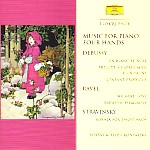Although the Kontarsky brothers largely earned their reputation for extraordinary performances of post-war avant-garde fare by Boulez, Stockhausen, and the like, they are absolutely stunning when it comes to Debussy and Ravel. Start with the Prélude à l’aprés-midi du’un faune, and hear how the pianists’ strong inner rhythm, intelligent dynamic scaling, and wide range of tone color almost make you forget the original orchestral version. En blanc et noir is a model of finger precision, tonal application, and characterful timing that makes most other performances of this late Debussy masterpiece sound comparatively fuzzy.
The brothers’ nuanced phrasing of the Pavane that opens Ravel’s Ma Mere l’Oye creates an illusion of more rubato than is actually applied. Petit poucet flies more than it hops, and very convincingly at that. The remaining movements contain some of the most ravishing, skillfully pedaled one-piano/four-hand playing in the history of the phonograph. The final movement of Rapsodie espagnol builds to a fervent, breathtakingly controlled climax that never lapses into pounding or banging.
The Kontarskys seem to transform Stravinsky’s Two Piano Sonata into a veritable woodwind ensemble where the rests breathe, the contrapuntal lines converse, and the timbres differentiate. I’ve often dismissed this piece as a dry, neo-classical exercise, yet this warm and witty performance confounds my prejudice.
Sonically speaking, these 1973 (Debussy and Ravel) and 1977 (Stravinsky) recordings come up a bit dry by today’s standards; otherwise they have aged well. I hope Eloquence will reissue the remainder of the Kontarskys’ Debussy/Ravel cycle (the whole thing once was available on DG Galleria). And while we’re at it, please, Please, PLEASE retrieve the Kontarskys’ standard-setting Stravinsky Concerto for Two Solo Pianos and Bartók Sonata for Two Pianos and Percussion from DG back-catalog limbo.
































